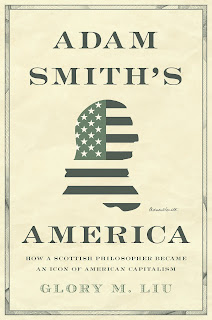
Liu applied the "Page 99 Test" to her new book, Adam Smith’s America: How a Scottish Philosopher Became an Icon of American Capitalism, and reported the following:
Page 99 of my book lands us in the middle of a discussion of key changes in academic political economy in America after the Civil War. Specifically, this page discusses the increased specialization in economics courses, and the influence of rival schools of thought, specifically the German Historical School. This is important context for what ends up being an inflection point in Smith’s American reception. American academic political economists begin historicizing Smith. They begin relegating him and his ideas to the past, though they never really give up on his lasting importance as the founder of the discipline.Visit Glory M. Liu's website.
On the one hand, I think readers will get a pretty good sense of what my book is like from this page. They’ll get a sense of how I chart important intellectual shifts, and in particular, they’ll get a little taste of how the shift from “Political Economy” to “Economics” in the academy changes the way people encounter, interpret, and use Adam Smith’s ideas in the late nineteenth century. By page 99, I’ve charted some of the origins and evolution of the discipline and shown how many political economists began to self-consciously style themselves as followers of Adam Smith, or continuing the tradition that Smith founded. On the other hand, I think readers might raise an eyebrow at what appears to just be a bunch of “textbook knowledge” about what academic economics looked like between, say, 1860 and 1890. The book is much more than a compilation of textbook knowledge about the history of economics. I use the history of economic thought in order to show how and why certain thinkers—like Smith—become canonized, often in narrow and politically charged ways. And I’m also interested in how Smith comes to represent an entire way of thinking, a mode of reasoning that becomes incredibly politically powerful.
--Marshal Zeringue



